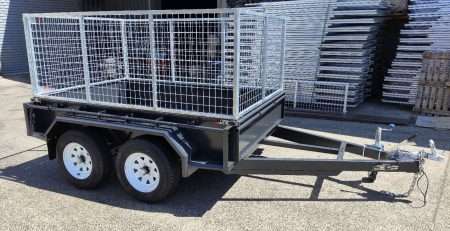
Level Up Your Towing Security: The Ultimate Trailer Hitch Lock Guide
Introduction to Hitch Locks
When it comes to securing your trailer, a small but significant device plays a crucial role: a trailer hitch lock.
What is a trailer hitch lock?
A trailer hitch lock is a device used to secure a trailer hitch and prevent theft or unauthorized use of the trailer. These locks are designed to prevent unauthorized access to trailers by securing the hitch to the trailer receiver, making it difficult for thieves to detach the trailer from the towing vehicle (car and driver). They add an extra layer of security to the standard hitch pin and ensure your trailer remains safely attached to your vehicle.
Importance of Hitch Locks
The importance of hitch locks cannot be overstated. They serve an essential purpose in preventing theft and ensuring the security of the trailer (The RV Geeks). It’s recommended for anyone who tows a trailer to use a hitch lock to protect their investment. Whether you’re towing a boat, an ATV, or a cargo trailer, a hitch lock is a small investment that can save you from the significant cost and inconvenience of trailer theft.
With the rise in trailer thefts, it’s more important than ever to secure your trailer with a reliable hitch lock. But a hitch lock isn’t just about security. It also adds stability to your towing setup and can prevent your trailer from accidentally uncoupling while in transit.
In conclusion, a trailer hitch lock is a vital accessory for any trailer owner. In the following sections, we’ll explore different types of hitch locks, how to choose the right one for your trailer, and how to maintain and properly use your hitch lock for optimal security. Stay tuned.
Types of Trailer Hitch Locks
Securing a trailer hitch is a crucial step for anyone who tows a trailer. A good trailer hitch lock prevents theft and unauthorized use of the trailer, providing an added layer of security and peace of mind. Here, we delve into the three main types of trailer hitch locks: coupler locks, receiver locks, and wheel locks.

Coupler Locks
Coupler locks are one of the most common types of trailer hitch locks. They are designed to fit over the coupler of the trailer, preventing anyone from hitching your trailer to their vehicle. Coupler locks are effective in deterring theft as they are highly visible and difficult to remove without the key or combination.
These locks come in various styles, including ball-hitch locks and coupler latch locks, each with its own level of security and ease of use (Car and Driver). The choice of coupler lock largely depends on the design of the trailer’s coupler and the level of security required.
Receiver Locks
Receiver locks are designed to secure the hitch receiver, the part that is attached to the towing vehicle. These locks work by securing the hitch pin, which is used to connect the hitch receiver to the trailer hitch.
Receiver locks add an extra layer of security, preventing the trailer hitch from being removed from the hitch receiver. Like coupler locks, receiver locks are also visible deterrents to potential thieves. For more on hitch receivers, check out our article on hitch receivers.
Wheel Locks
Wheel locks, also known as wheel boot locks or tire locks, secure the wheels of the trailer, preventing the trailer from being moved. These locks are often used in conjunction with coupler or receiver locks to provide maximum security for the trailer.
Wheel locks are especially effective for trailers that are parked for extended periods, as they not only deter theft but also prevent unauthorized towing. They are easy to install and provide a visible sign that your trailer is secured.
Each type of trailer hitch lock serves a specific purpose and provides a different level of security. It’s important to understand the features and benefits of each type to make an informed decision on the best lock for your trailer.
Choosing the Right Hitch Lock
Protecting your trailer from theft involves more than just selecting any available trailer hitch lock. Choosing the right hitch lock requires understanding the lock sizes, ensuring compatibility with your trailer, and considering essential security features.
Understanding lock sizes
Trailer hitch locks come in various sizes, each designed to fit a specific type of hitch. Common hitch sizes include 1-1/4″, 2″, and 2-1/2″. It’s crucial to measure the width of your hitch receiver accurately to ensure the lock you choose will fit correctly. If the lock is too large, it may not provide adequate security, and if it’s too small, it simply won’t fit.
Compatibility with Your Trailer
The type of trailer hitch lock you choose should also be compatible with your trailer’s hitch type. Trailer hitch locks come in different types, including coupler locks, receiver locks, and universal locks. Each type has its own advantages and is designed to fit specific trailer hitch configurations.
Coupler Locks: Designed to fit over the trailer coupler, preventing it from being hitched to any other vehicle.
Receiver Locks: Secure the connection between the hitch receiver and the trailer ball mount.
Wheel Locks: Immobilize the trailer by preventing the wheels from turning.
It is important to understand the type of hitch your trailer uses to select the most effective lock.
Security Features to Consider
When choosing the best trailer hitch lock, consider security features that enhance the lock’s effectiveness. Look for locks with advanced locking mechanisms to deter picking and drilling. Weather-resistant materials can help prevent rust and corrosion, ensuring the lock remains durable and functional over time. Some locks also feature advanced technology, such as keyless entry or alarm systems, for added security.
Remember, the choice of a hitch lock should be based on your specific needs and the type of trailer you own. By understanding the different types of hitch locks and their features, you can make an informed decision and enhance the security of your trailer. Don’t forget to check out other towing accessories like electric winches, trailer wiring harnesses, and trailer light kits to ensure a safe and smooth towing experience.
Hitch Lock Maintenance and Usage
Once you’ve selected the right trailer hitch lock for your needs, proper installation and regular maintenance are key to ensuring its longevity and effectiveness. In this section, we’ll provide guidelines on the correct installation of a hitch lock and tips on maintaining it.
Proper Installation of Hitch Locks
Installing a trailer hitch lock correctly is crucial to preventing theft and unauthorized access to trailers. The lock should fit snugly and securely to minimize any movement or rattling that could compromise its effectiveness.
First, ensure the hitch receiver and the locking mechanism are clean and free from debris. A clean hitch lock is easier to install and will function better. Next, insert the lock into the appropriate slot in the hitch receiver or the coupler, as per the type of lock you’re using. Follow the manufacturer’s instructions when engaging the locking mechanism. Once installed, the lock should fit snugly and not move or rattle when the trailer is in motion.
Remember to check the lock’s fit and function regularly, especially before long trips. If you notice any problems, it’s best to address them immediately to ensure your trailer remains secure. For more information on hitch receivers, refer to our article on hitch receivers.
Regular maintenance tips
Maintaining your trailer hitch lock is equally important as installing it correctly. Regular maintenance ensures the lock continues to function properly and can extend its lifespan.
Lubrication: Regularly apply a lubricant to the lock mechanism. This helps keep the mechanism smooth, preventing it from becoming stiff or jammed.
Inspection: Regularly inspect the lock for signs of damage or wear. If you notice any issues, it’s best to replace the lock to ensure your trailer’s security.
Cleanliness: Keep the lock clean from dirt and debris. A dirty lock can become difficult to operate and may not provide the level of security you need.
These tips can help keep your trailer hitch lock in optimal condition, ensuring it continues to provide reliable security for your trailer (car and driver). For more information on maintaining different types of towing equipment, refer to our articles on trailer brake controllers, electric winches, and trailer wiring harnesses.
Remember, a well-maintained hitch lock not only secures your trailer but also gives you peace of mind when your trailer is parked or on the move.
Legal Aspects of Towing
When it comes to towing, there are specific regulations and safety requirements stipulated by the Federal Motor Carrier Safety Administration (FMCSA) that must be adhered to. These regulations are put in place to prevent accidents and ensure the safety of all road users.
FMCSA Regulations for Towing
The FMCSA, in Section 393.70(d) of its regulations, requires that every full trailer be coupled to the frame, or an extension of the frame, of the motor vehicle that tows it with one or more safety devices. This is to prevent the towed vehicle from breaking loose in the event the tow bar fails or becomes disconnected.
If the design of the drawbar is such that bolts, connecting pins, etc. are used to connect structural members of the drawbar and are located at or near the midpoint of the drawbar (beyond the attachment points for the safety chain at the ends of the draw bar), the safety devices would have to extend from either the frame of the towed or towing vehicle to a point beyond the bolts, connecting pins, or similar devices.
In the case of an extendible draw bar or reach, if a separate safety device(s) is used for the front and rear of the drawbar, a means must be provided to ensure that the draw bar will not separate from the movable portion of the drawbar. The use of welded tube stops would satisfy the intent of § 393.70(d) if the ultimate strength of the welds exceeded the impact forces associated with the drawbar extending suddenly with a fully loaded trailer attached.
Safety Devices Requirement
The FMCSA regulations also state that the use of a pair of safety chains or cables between the towing vehicle and the front of a fixed-length draw bar, or an extendible draw bar, with a separate pair of safety chains or cables between the end of the draw bar and the front of the towed vehicle can meet the requirements of § 393.70(d) as long as the safety devices prevent the drawbar from dropping to the ground in the event it fails or becomes disconnected, and the vehicles will not separate if the draw bar fails or becomes disconnected.
These regulations emphasize the importance of using a robust and reliable trailer hitch lock, not only to protect your trailer from theft but also to ensure safe and legal towing. For more information on choosing the appropriate hitch lock for your trailer, refer back to our guide on Choosing the Right Hitch Lock.
Author
I am Rahatul Ashiq Tamal. Another author of Muscle Trailers. Muscle Trailers is a well-known trailer brand in Sydney, Melbourne & Adelaide

How to Mount a Spare Tire on Your Trailer: A Simple Step-by-Step Guide
Trailer service centers receive over 1 million phone calls and 1.3 million emails each year about trailer maintenance problems....

How to Fix RV Roof Leaks: Simple Roof Leak Detection Guide for Beginners
Did you know DIY RV roof repairs can cost under $50? But undetected leaks could lead to substantially higher repair...

Starting a Food Truck Business in Australia: From Trailer Selection to Launch
The Australian mobile food market has evolved into a billion-dollar industry. This makes a food truck...
